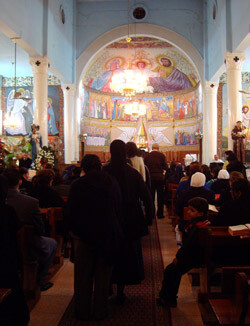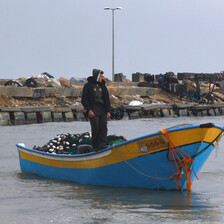The Electronic Intifada 7 January 2011

Palestinian Christmas under occupation. (Eva Bartlett/IPS)
“We are from Palestine and our lives aren’t easy: we are under occupation, under siege, and we’re prevented from visiting our holy city, Bethlehem,” says Tawwil, Member of Parliament in Gaza. “We don’t truly feel like we are celebrating holy days, not in the way we’d like to.”
Bendali Tarazi is a Christian living in Gaza City. “We celebrate Christmas as we can. On Christmas morning, my family and I pray at the church, and after the service we visit our relatives then go home for a Christmas meal together.”
Like most Palestinians in Gaza, Tarazi suffers from Gaza’s imprisonment under siege and the constant threat and reality of Israeli attacks.
“Everything is difficult here, for all Palestinians, not just Christians. We are in a huge prison together, and not just locked in but under complete siege, where virtually nothing and no one gets in or out through the borders. And there are constantly new Israeli bombings and demolitions.”
Israeli authorities and various news outlets announced exit permits for 500 Gazan Christians to Bethlehem this Christmas. But Tawwil says this news is not as it seems.
“Of the 500, there are Orthodox Christians and Catholic Christians. The Catholics celebrate on 25 December, and the Orthodox celebrate on 7 January. Those who celebrate in January were given permits to go to Bethlehem before their holy day. Those Christians who would like to have gone for the 25th didn’t get a permit.”
Bethlehem and Jerusalem are two of Palestine’s holiest sites, and for both Christians and Muslims, they are infinitely out of reach.
“The Israeli occupation authorities prevent Christians in Gaza and the occupied West Bank from going to Bethlehem at Christmas just as they prevent Muslims from going to al-Quds [Jerusalem] during Ramadan,” Tawwil says.
Attaining a permit is no easy matter. “You must be older than 35 years, which immediately eliminates the majority of Gazans,” explains Tawwil. “And, the Israeli occupation forces arbitrarily decide who may exit or not, regardless of age or even holding a permit. They never have to explain the reason why.”
According to Tawwil, although 500 Palestinians from Gaza may have been granted exit permits, in reality not all 500 will be able to leave, or want to, depending on when they celebrate Christ’s birth.
Bendali Tarazi has experience with this. “Last year I got a permit to travel to Bethlehem, but when we learned that my wife didn’t get one, I couldn’t leave without her, as much as I wanted to see Bethlehem at Christmas. It’s our holy city, our land, but we aren’t allowed to go to it at the most important time of the year.”
This is common, says Hossam Tawwil. “Sometimes parents will get the permit but their children will not, so no one goes. Or only one of a couple will get the permit, so neither goes.”
Families suffer from other siege and war-related consequences.
“Virtually every family has lost someone from their family. Maybe they have a child imprisoned in an Israeli jail, or who was martyred in Israeli attacks, or was ill and died because he couldn’t get treatment under the siege,” Tawwil says. “During holidays families remember their lost loved ones all the more. Any holiday, without loves ones, isn’t a good holiday.”
With Israeli attacks newly escalating, the threat of a new war on Gaza clouds the holiday merriment. “Many feel there is a new Israeli war coming to Gaza soon. There are already random bombings,” Tawwil says.
The siege and war-orchestrated financial disaster of Gaza’s economy means that families lack the money and means to celebrate as Christians worldwide might.
“No work, no money, we can’t buy the gifts and special foods that make the holiday magical,” says Tawwil.
Tawwil disputes reports of Muslim-Christian animosity. “Muslims have the same problems as Christians do in Gaza. We live together, as neighbors, under the same siege, occupation and same Israeli attacks.”
Ahmed Mahdi, a Muslim in Gaza City, has Christian neighbors. “We are good friends with our neighbors, and visit them during their Christian holidays,” Mahdi says. “And they visit us during our Muslim holidays. We feel and act like family.”
Like Mahdi, Tawwil and other Christians share Muslim holy times.
“We are with them for Muslim holidays, we celebrate with them as if its our holiday. We don’t feel a difference between Muslims and Christians in Gaza.”
“The occupation does not allow for freedom for any religion other than Judaism. Aside from banning us from our holy places, the Israelis have attacked and destroyed our churches and mosques,” notes Hossam Tawwil.
Ahmed Mahdi’s message is simple. “I just wish that this year is better for Palestine’s Christians, and that Christians everywhere celebrate and enjoy their holy day.”
All rights reserved, IPS — Inter Press Service (2011). Total or partial publication, retransmission or sale forbidden.





